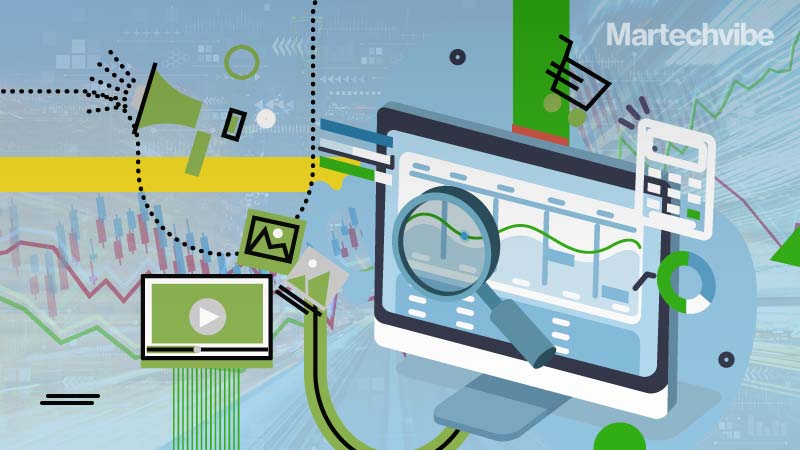Saudi Arabia’s Ever Evolving Martech Landscape
Market technology has experienced rapid changes over the last two years, and this trend will continue in 2022. A Capital Economics report said the Kingdom of Saudi Arabia could expect its economy to grow by 6.3 per cent in 2022 2022 is predicted to be the second “golden age” of MarTech, with the most powerful […]
Topics

Market technology has experienced rapid changes over the last two years, and this trend will continue in 2022. A Capital Economics report said the Kingdom of Saudi Arabia could expect its economy to grow by 6.3 per cent in 2022

2022 is predicted to be the second “golden age” of MarTech, with the most powerful marketing technology trends growth.
In Saudi Arabia, big martech players, such as Sitecore, are increasingly collaborating with local companies to provide solutions and enhance the seamless and personalised digital experience for customers.
Since the COVID-19 pandemic began, eCommerce has developed at an unprecedented rate, and this trend is certain to continue. The Kingdom has seized on eCommerce’s potential to boost cross-border business and position it as a digital leader in response to this spike in demand.
By building a robust eCommerce sector with the appropriate regulations, it’s within reach for the Kingdom to become a regional eCommerce powerhouse.
Buyer intent is strong. According to a Mastercard poll, 77 per cent of Saudi Arabian customers are purchasing online more frequently now than before the outbreak. According to a recent eCommerce study conducted by Mastercard, the proportion of online consumers in the kingdom outstripped the regional average of 73 per cent.
eCommerce has several advantages, like minimal financial costs, the opportunity to sell abroad, and the capacity to personalise the purchasing experience.
The Kingdom, a consumer-driven market, boasts the most affluent customers and a youthful, tech-savvy populace.
According to the National Research Group and Cassandra, the use of smartphones among younger generations in the KSA is “evolving” how these consumers engage with society, enjoy media and make purchases.
“Every sector of the Saudi economy for business-to-consumer (B2C) goods and services saw increased digital spending in 2021, with data pointing towards a particular increase in grocery, electronic goods, and clothing purchases,” Reem al-Harbi, Checkout.com’s General manager in Saudi Arabia, told Al Arabiya English.
In fact, HSBC found that Saudi Arabia has the largest number of millennial entrepreneurs worldwide, adding that entrepreneurs work 2.5 hours more than similar businessmen globally.
Meanwhile, businesses in the Kingdom, as is across the world, are being transformed by digitisation. According to a new YouGov survey, 92 per cent of Saudi Arabia’s government IT decision-makers agree that the Covid-19 pandemic has accelerated their digital transformation over the past year.
Brands Are Getting On Board
Many big names have collaborated or raised funds to accelerate their digital transformation. In February, Sitecore partnered with solutions by stc to deliver marketing technology and training to the country’s main public and private enterprises. According to a statement, the decision demonstrates the company’s commitment to the Kingdom’s fast digital transformation initiatives.
The joint efforts will see an enhancement in the digital experience for customers, which will be made possible with an integrated CMS powered platform along with various commerce and digital marketing tools.
In January, Evolving Systems also announced a strategic partnership with Zain Saudi Arabia to deliver a crucial component of its new loyalty offering. With its digital-only telecom product vehicle, Yaqoot, Evolving Systems is bringing a new solution to enable the operator to build game-changing digital experiences for its consumers.
At LEAP, the global technology exhibition held in Riyadh in February, Unifonic debuted its new brand. Unifonic’s brand has grown to represent its mission of creating actual moments of connection between people and organisations as it continues to build its customer engagement platform with creative solutions that match increasing demands.
This is yet another significant step forward for Unifonic, which comes on the heels of the company’s recent $125 million Series B fundraising round spearheaded by SoftBank Vision Fund 2 and Sanabil Investments. The brand has been evolving rather quickly by building new solutions for their customers, and entering new markets.
The movement of enterprises from brick-and-mortar retail to eCommerce has created demand from customers for more efficient and fast delivery service as the digital revolution advances.
Delivery-as-a-Service (DaaS) startup BARQ had raised $4 million in its funding round to deliver growth. The startup uses state-of-the-art delivery technology to fulfil orders as quickly as 15 minutes up to same-day delivery service in various industries, including eCommerce, food, e-groceries, and other sectors. BARQ turns retail shops into micro-fulfillment centres/dispatching hubs, making delivery faster and easier in response to the pace of digital transformation, the shift of businesses from retail to online, and rising customer demand for a better and faster delivery service.
“We’re on a mission to transform and automate overall business and consumer experience from order creation to delivery. We’ve identified a lot of inefficiencies across our served sectors and started with the toughest – last mile,” said Co-founder/CEO Abdullah AlShalhoub.
In January, tech startup Lucidya had raised $6 million in its funding round led by Rua Growth Fund. The brand focuses on analysing customer interactions in the country’s local language “Arabic”. The startup aims to provide its products to businesses in other Arab countries who face the same challenges that customers in Saudi Arabia face, which is the ability to analyse Arabic content in online channels.
Customer-Centric Objectives
Last December, Medallia launched servers in the Kingdom to facilitate access and compliance. Medallia, in partnership with New Metrics, offers clients across the Middle East the technology required by public and private sector clients to achieve their citizen and customer-centric objectives.
By providing completely compliant cloud technology as well as local and regional consultancy capabilities, Medallia and New Metrics are changing the game for Saudi companies.
Last May, Raydiant, partnered with trustangle in Saudi Arabia and THAT Media Studio in Kuwait, furthering their global expansion throughout the Middle East. The Raydiant experience platform delivers personalised experiences that help grow brands’ in-location business. Digital solutions offered by the company help employees and customers to have a better experience. They are cost-effective, reliable, innovative, and easy to use.
The Kingdom is a powerhouse of developing and innovative technologies, with established enterprises and startups using AI, machine learning, and Augmented Reality not only to deliver a wide range of solutions but also to raise brand recognition.
Augmented Reality In The Region
According to Snap’s business reports, discretionary spending power for the Snapchat Generation reaches 1.4 trillion Saudi Riyal in Saudi Arabia and around $58 billion in UAE.
Last October, Snapchat asked advertisers to try out their augmented reality capabilities to see how businesses could leverage them. The business campaign featured regional activations by Adidas, Ounass, Nestle, stc, and StarzPlay, and demonstrated how businesses might utilise sponsored Lens.
With almost 90 per cent of Snapchat’s daily users in Saudi Arabia already interacting with the company’s AR lenses on average more than 30 times per day, according to the firm’s own data, the AR phenomenon looks set to make a big impact across multiple sectors.
Furthermore, more than 90 per cent of 13 to 34-year-olds are using the app. The potential applications of AR in the Kingdom in everything from shopping and schooling to navigation and home entertainment are immense.
An interesting use case of the AR feature breezed in when Snapchat users were able to explore six of Saudi Arabia’s hidden cultural gems on September 23 to celebrate Saudi National Day. Few Saudi cultural landmarks had been digitally rebuilt in 3D, allowing people to virtually explore them as if they were physically present at the location.

To mark Saudi National Day on Sept. 23, Snapchat allowed users to explore six of the Kingdom’s hidden cultural gems.
Deloitte, the consultancy firm, says AR adoption rate in the Kingdom is in keeping with the mobile usage boom, with almost all of Saudi Arabia’s “millennials” and “zoomers” expected to be frequent AR users by 2025.
There are plenty of digital marketing opportunities in Saudi Arabia. The martech experience is fueled by a wealth of data, which allows marketers to tailor the customer experience down to the individual. It’s time for businesses to recognise the importance of investing in automation, optimisation, and customisation to take customer service to the next level and become truly omnichannel.
If you liked reading this, you might like our other stories
5 Reasons Why Saudi Arabia Tops The Digital Riser List
Saudi Arabia Makes A Big LEAP In Digital Transformation






